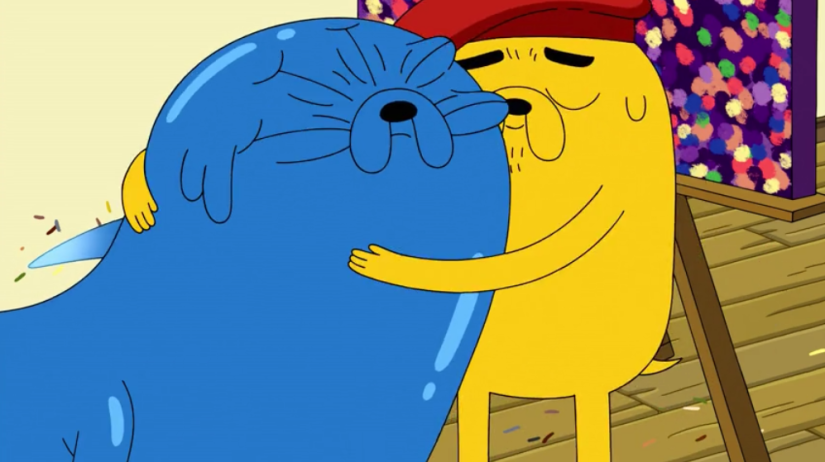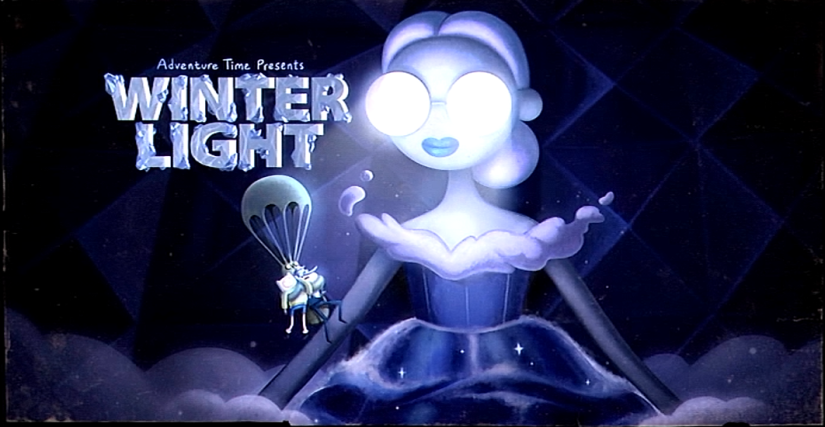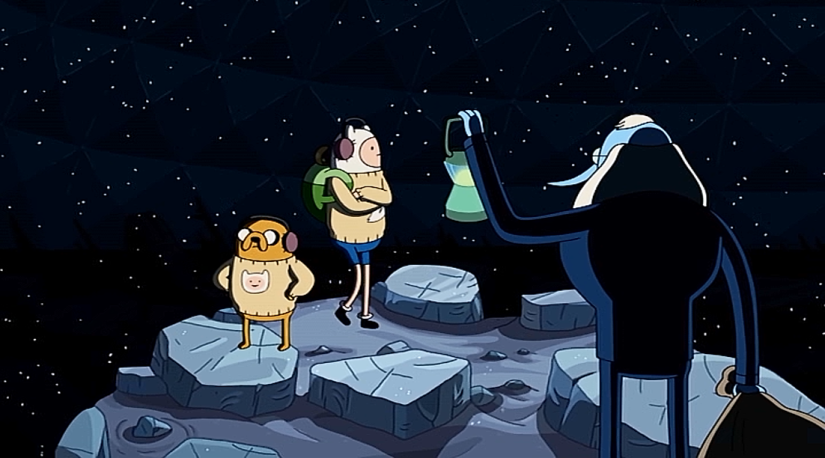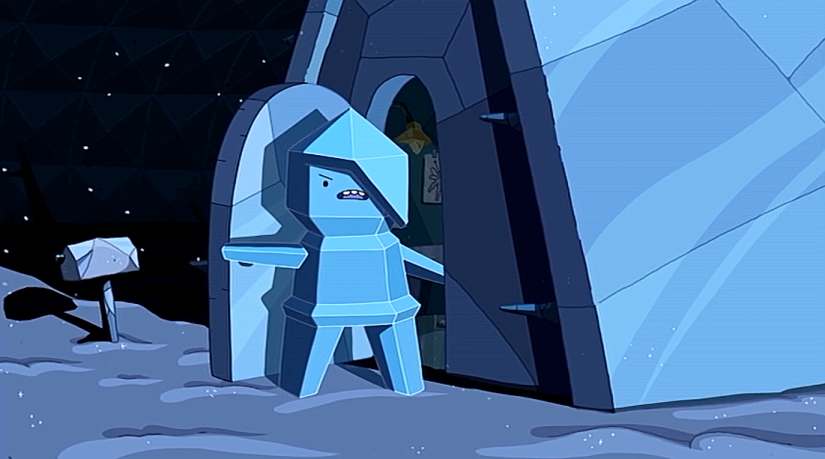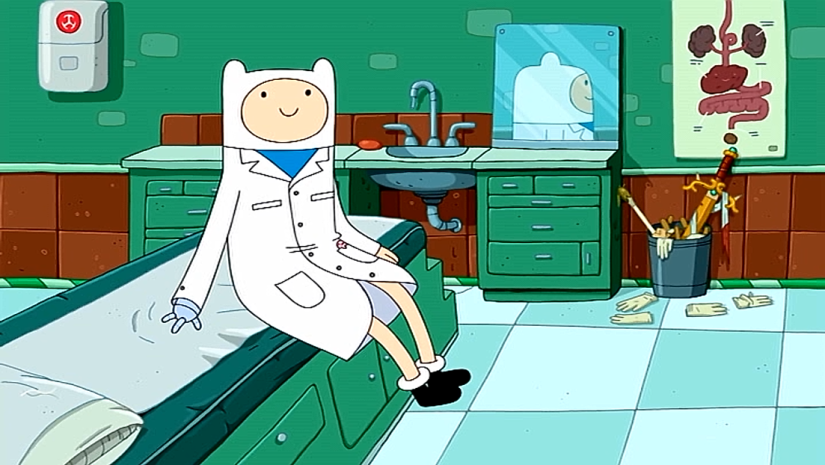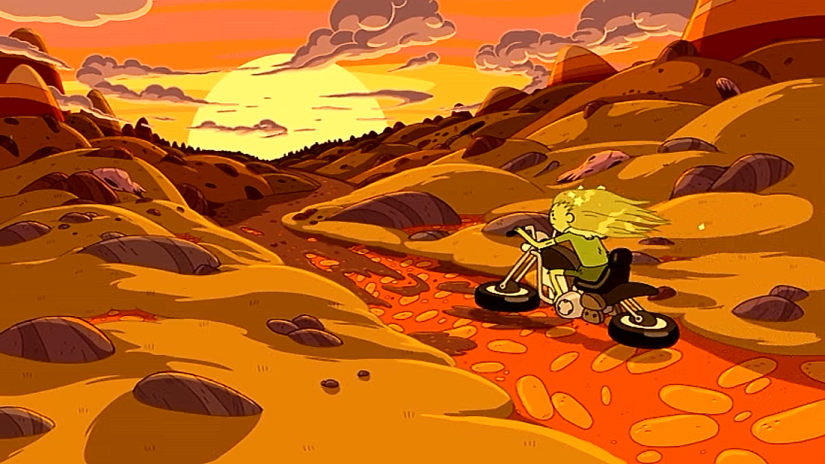
Original Airdate: July 25, 2020
Written & Storyboarded by: Hanna K. Nyström, Iggy Craig, Laura Knetzger, Anna Syvertsson & Adam Muto
Before we start, I wanted to plug a project from my friend, Paul Thomas. Paul has written a really neat account of Adventure Time‘s production history, storytelling mechanics, and its fandom. I also contributed a small portion to the book as an interview piece in the fandom section, under my full name, Eric Stone. Though I haven’t been able to read through it fully yet, it’s a really detailed and packed novel that I think any Adventure Time fan should surely check out. You can read this novel here!
Welp, here we are kiddos! Most fandoms have to wait like, 10 years for new content after an original IP ends, the AT crowd has been blessed with new stuff only two years down the road! The sweet part about this is it probably wasn’t too hard to wrangle up most of the original crew (as of this episode, we have Adam Muto, Hanna K. Nyström, Jack Pendarvis, Andy Ristaino, Benjamin Anders, Anna Syvertsson, Laura Knetzger Michael DeForge, Jesse Balmer, Amber Blade Jones, the Frederator crew, and Tim Kiefer as returning members; correct me if I missed anyone) and the style is able to remain pretty true to the original, with some added upgrades. And for the most part, BMO does manage to capture that AT feel more than I was originally expecting from it.

As a precursor, I’ll mention that it’s good to be back in this role. I truly have missed talking about AT in any capacity, and honestly, it really took new content to get my motivation back again. It is definitely strange to be talking about it in this position – I had reviewed each episode long after their initial airdate. There’s a large community of cartoon reviewers that can probably get to this faster than I can and likely say everything that I would have already said otherwise. That being said, I hope that I continue to add a layer of freshness to these reviews and that there is still a desire for open discussion around this blog and its themes. That aside, let’s get down to the good stuff.
Distant Lands immediately sets itself apart by having a distinct opening that feels slightly alien in comparison to any AT content that we’ve seen prior. Despite its namesake, Distant Lands doesn’t borrow from Adventure Time‘s opening credits much at all. It appears each special will have its own unique opening, with the additional interstitial beginning that features a quick bombardment of past AT characters and moments. Lack of lyrical accompaniment aside, BMO‘s intro does follow the standard that most AT opening titles follow – it’s a sweeping journey, filled with familiar sounds, and an eventual climax to the central focus. This beautifully crafted CGI intro was animated by Encyclopedia Pictura, a film and animation studio that has worked on some really gnarly stuff, including music videos and bizarre, but beautiful, short films. Their attention to bright, vivid colors and smooth designs make me truly crave a fully guest animated 11 minutes from them, but I suppose we’re past that point… for now. The ending credits also feature a cameo of AstroBMO, which is a real life BMO that was sent into space!

I was initially a bit cautious about BMO having his own 44 minute special. With some clear exceptions, BMO is very much a comic relief character. She certainly has her depth and isn’t only good for jokes, but BMO isn’t necessarily an “epic” character by any means. Not to mention that Adventure Time has really only dabbled with the 44 minute formula once before with Come Along With Me and… yeah, that was a bit messy. I will say that the two aspects of the special I was most concerned about were actually some of the strongest elements. BMO, per usual, is his usual lovable self. Even if his dialogue isn’t laugh-worthy, it is undeniably charming. BMO’s bizarre dialogue and tendency to not understand structural sentences really never tires itself out, which could be chalked up to solid writing, but it’s also just Niki Yang being the absolute best at what she does. I don’t think I praise her enough on this blog, but Yang’s dedication to really embodying the character and knowing just how to hit all of the right notes for a successful delivery always pay off so well. I think voice actors very much embody their character and cannot be replaced, but there are surely occasional issues with delivery that can sink certain impactful moments for individual characters. I feel like Yang almost never skips a beat – almost because BMO’s inflections are, by nature, slightly monotonous, but I mean that in the most loving way. Even when just speaking in her natural voice, Yang recognizes how to add an extra bit of gusto every single time she gets in that recording booth.
BMO’s silly opening monologue is lots of fun, and it’s a great way to showcase all of the visual elements that this special has to offer. BMO alone gets a pass for being absolutely gorgeous – Adventure Time has never looked so good! The lush colors and richer backgrounds (though somewhat of a departure from the original series) felt like breath of fresh air. I mean, don’t get me wrong, Adventure Time has never looked bad (okay yes Seventeen exists. I know, guys) but the increased budget that Max has allowed for is certainly noteworthy and quite frankly exciting. Imagine what a Finn and Jake adventure is gonna look like on a high budget! Impressive colors and animation aren’t the only new element in the visuals department that BMO brings to the table – or in this case, an old element – the return of the eye whites! Eye whites were retired from the series around season two because Pen felt that it took viewers out of the universe and made characters feel less “human.” BMO is drawn with them as he transcends into The Drift, and while I’m not the hugest fan of them myself, it is kind of nice to see them back in this fashion. It’s a visual element that does add to Distant Lands‘ clear interest in expanding on the design of the original series. ALSO, it’s around this point that we meet Olive, one of the cooler characters that BMO dishes out. In typical AT fashion, Olive’s simple design is her biggest strength, being both very charming and intriguing from a minimalist perspective. Olive also provides for some gnarly shapeshifting moments, easily filling in Jake’s shoes while he’s absent.

After we get this establishing piece with BMO and Olive, we’re treated to another establishing piece within the Drift, where we meet the other featured characters and settings of this special, which are some of the weaker bits, in my eyes. Elaborating on what I said about the visuals above, the backgrounds within the Drift are gorgeous. They certainly are a bit of departure from what we’re used to seeing from the original series – Ghostshrimp’s backgrounds were filled to the brim with every possible apocalyptic Easter egg and neat hunk of junk that he could imagine, while the background artists clearly focused on more interesting textures and attention to color for BMO, and that works just as well. I was surprised to see just how thick some of the outlines were within several backdrops – really makes the whole thing feel like a comic in motion. Which… I suppose is exactly what animation is. Hmph.
It’s here that we’re introduced to Y-4 (later known as Y-5) who is… okay! I actually think her design is very cute and she’s competently portrayed by Glory Curda, but her character isn’t really super compelling in any way. That’s not to say that she’s bad! I didn’t actively dislike any aspect of her personality or arc, but it never really managed to grab me in one way or another. Her relationships with other characters end up putting her in pretty predictable spots, namely that her obedience to her parents would end up causing a tiff in her newly found friendship with BMO, and that her relationship with her parents would ultimately come to a resolve when they recognized the error of their ways. It’s all stories that we’ve seen in other movies and shows before, and while none of it is done badly, it’s not the type of story that I feel is captivating for me personally. I do have to give Adventure Time credit where its due because, while the parents that don’t trust their child is a trope that’s been tackled before, it’s a bit new to Adventure Time. Parental figures within the original series are usually just straightforward really shitty or astute moral guardians. Here, these parents act shitty, but it’s both resolved and tackled in somewhat interesting way regarding their unbridled faith towards governmental power.

The aliens we see throughout this special, namely the Shells and the Elves, are decently fun. They have the same goofy disagreements that would be commonplace in Ooo, yet are unique in their foreign designs. I do think AT‘s character team is really smart with understanding what works for different settings; I don’t know what it is about the Elves and Shells, but they just feel like beings that wouldn’t really be fitting for Ooo, even if it is an open world for all kinds of weird inhabitants. These aliens feel akin to On the Lam, in the way that they aren’t a complete departure from AT‘s style, but feel off enough that they wouldn’t necessarily be roaming the Earth either. It’s also fun to see how, despite the fact that they’re portrayed as the antagonists, BMO’s kind of the asshole that gets in THEIR way, and the episode has a lot of fun with that. BMO is most fun when he’s only interested in satisfying his own needs and gives zero fucks about anything else. That’s not to say she isn’t still sweet and lovable, but anything that doesn’t directly inconvenience her isn’t really an issue. This also leads to one of the funniest moments in the episode, in which BMO is lauded for single-handedly saving everyone in The Drift… with the exception of the Elves’ leader. Let us also not forget the BMO is the one who caused this breach in the first place!
Y-5 and BMO’s relationship is pretty similar to the E.T. type kinship that has become commonplace in cinema and television, but it is, at the very least, delightful. They have some pretty humorous back-and-forths, with a highlight being BMO’s sass anytime Y-5 tries to question or contradict him. As they begin to explore The Drift further, we’re treated to a decent amount of world-building. I don’t think The Drift is especially mindblowing or distinctive from any other fictional space station, so it’s the AT charm that really helps set it apart from any other generic location. I love the parrot merchant shouting, “buy my eggs! Buy my eggs! Or I swear to Glob, I’ll eat them myself,” and the squidlike alien that wants to eat his space lards. Again, it’s cute how everyone treats BMO as this really noble and heroic icon when he clearly is just speaking from a child’s perspective. He likes the cute space lard, so he’s going to protect the cute space lard. That’s really all there is to do it. Long live BMO and her love for the name Ricky.

Two characters I actually had completely forgotten about before rewatching are Sweetie and Darling, the heist bugs! I feel guilty even saying that because, while their designs are pretty unremarkable, they are plenty of fun. BMO’s second big task in the Drift is a rescue mission after a communications hub floods. This is one of my favorite bits of the special, namely because of how fluid the animation is throughout the entire sequence. There’s a ridiculous amount of motion during the scenes that feature Y-5 swimming, with so many little fun details that are easy to miss, such as BMO riding her head like a cowboy as she tries to communicate with her parents. It’s a scene that, again, would likely be an afterthought in terms of visual flair when Adventure Time was on a television budget, but now we’re on HBO, bitches! It really helps add to the general frantic nature of the sequence, and really pays off as a visual delight.
The main conflict really sets in when BMO is sent on a governmental mission by Hugo and Mr. M. Hugo is somewhat in the same realm of Y-5’s characters, though I’d say that Y-5 probably has more going for her. He’s mainly just there as plot device for villainy to take place – I’m not even entirely positive that I fully understand his story or his plan. So, he was a human who sought to survive the apocalypse of mankind by traveling out into space and he made a compromise with aliens to remove the humanity of himself and his crew. That succeeded… but also caused some sort of societal collapse? And then as they were drifting through space, Olive picked them up and warped them into the Drift, and then Hugo decided to proclaim himself as the leader? It’s an arc that, unless I’m missing something, feels like a haphazard attempt at world-building and doesn’t seem concise in its characterization or the timeline it wants to set up. Were Hugo and crew members just floating through space for hundreds of years? I dunno, I guess it doesn’t really matter in the grand scheme of things. It’s cool we get to learn more about the other options of humanity following the Great Mushroom War, and the best part of all? The entire backstory sequence is animated by David freakin’ Ferguson himself! It was really nice seeing his style back once again, especially with the manner in which it was utilized. I’m glad that, despite the overwhelmingly negative reception Water Park Prank got, Ferguson still got the chance to come back and share his unique artwork with a mainstream audience. You da man, Ferguson!

Mr. M, on the other hand, is a really interesting side villain, mainly because of the fact that he quite obviously is none other than Martin Mertens! Well, maybe not entirely obvious, but enough information is presented to draw up a conclusion. I really like the fact that, despite the fact that Mr. M is very clearly supposed to be Martin, the episode never outright has him reveal himself. There’s the certain bit of anticipation throughout the special that he will be exposed, but you never truly get that full satisfaction, which in turn makes the payoff even more satisfying. It personally reminded me of the visual gag of Dr. Princess dressing up as Science Whyzard, only with much more purpose and attention this time around. There’s several different indicators that Mr. M is Martin Mertens, including quotes that he’s used before previously, the fact that his feet are very clearly human, and the namesake alone. There are some additions that I don’t really care for, like the fact that Mr. M jokes with Y-5’s parents about being called out for their deadbeat nature. It’s throwaway line that’s only used to further identify Martin, but since he didn’t have a tumultuous relationship with his son at this point in the timeline, it just doesn’t really make sense. Of course, I’ll discuss more about the fact that this special is a prequel later on, but might I just add that I’m glad it is, because if Martin’s cosmic destiny just meant he was a grifter in space elsewhere, that would be really fucking lame.
The eventual tiff between Y-5 and BMO is played out in a way that mirrors this type of trope in most buddy-buddy stories, so it doesn’t feel particularly enticing when you can kind of seeing it coming from their first interaction together. Thankfully, the drama isn’t played up too much, and BMO has lots of funny lines to make up for it, including “I have no feelings,” followed almost immediately by “you make my feelings happy!” It does help provide for a solo BMO journey into the Jungle Pod, which ends up making for the best parts of the episode. I standby the idea that all of BMO’s strongest moments are just when he’s alone and chatting to himself. Or, in this case Football, who increasingly becomes a coping mechanism to help BMO deal with the thoughts and fears inside of her head. This mechanism of placing her own fear onto her imaginary friend only gets BMO so far, as she finds herself in certain danger pretty quickly. The winged crabs were also a nice touch for this special, which I’m pretty sure was a reference to Abstract, was it not? When Jake’s alien form sprouts wings, BMO accuses Jake of being a “crab.” Maybe I’m digging too deep, but I thought of this almost immediately. It’s a shame Crusty died as quickly as he lived. R.I.P. my man.

Things take a very dramatic turn when BMO is ripped apart after taking the Jungle Pod’s crystal, where we are treated to what feels like a classic AT bad trip. In a similar fashion to BMO Noire, Niki Yang delivers each line as she normally would for BMO, yet the framework of the scene helps it to come across in a much more unnerving fashion. Because of BMO’s role as a child, any mention of death or substantially dark topics come across in this really uncomfortable fashion, and I mean that in the best way. Like previous BMO entries such as BMO Noire, BMO Lost, and The More You Moe, The Moe You Know, BMO understands how to balance the humor of the character, as well as the very dark reality that he’s only a mere child in a very threatening world. BMO’s colorful subconscious returns during his “death” and reminds him of the inevitable: that he is just a lil kid in a big world that’s often times difficult to navigate. Again, I think it’s kind of a familiar path for this type of story to take – the hero discovers he/she is in over their head and temporarily admits defeat. But since it’s portrayed in such a dark, visually interesting matter that only AT could pull off so well, I really don’t mind it at all.
The climax of the episode, which involves Y-5 rebelling against her parents in order to save BMO. It’s where we meet CGO, who had appeared earlier in the episode for a brief moment, and heard singing the Frasier theme song. I do like how the major connections to the old world are mainly drawn through theme songs of classic sitcoms. CGO is a fun little bot herself, kind of reminding me of a toned down Carroll. Her introduction also provides for a genuinely emotional moment in the episode in which Y-5 breaks down into tears after learning the truth about Hugo. It’s a small, quiet moment, but it’s quite impactful. Y-5 is essentially learning that everything she has worked hard for to achieve, whether for herself or for her parents, has virtually been for nothing, and that the only one who could have saved her might be dead. AT‘s sadness is usually confined to these quiet, ambiguous moments, but Y-5’s sadness takes the Steven U route of being heavily tearful, which hits pretty hard. Of course, BMO ain’t dead though, you dumb babies!! He is revived in the midst of Y-5’s breakdown, and the two travel to save The Drift together.

Hugo is outed, and though I don’t think his plan is entirely fleshed out, his argument against the citizens is pretty interesting. It’s not really a good argument; Hugo’s essentially just saying that the citizens of The Drift are just as selfish as him because they didn’t really care about what happened to it as long as they were able to leave. It does tie into the fact that civilization and humanity in of itself is predominantly selfish, and Hugo believes he’s truly just one of those citizens that happened to have made it out on top. The climax comes together in a pretty satisfying way, as the many minor characters that we’ve met throughout this special team up to stop Hugo from destroying The Drift. Y-5 also makes amends with her parents, which does feel earned in the sense that her parents feel like decently rational people by the end of it, despite their shitty ways. And best of all, Olive gets what she always wanted – and presumably Hugo as well – a friend!
The ending of BMO closes out with the biggest surprise and possibly the biggest delight of all: it was a prequel! For the first time ever in AT‘s history, we get to see a toddler version of Finn and a teenage version of Jake! It’s a really sweet twist that makes any qualms that I would have with the story, such as Martin being a space grifter, essentially moot. Though I’m not necessarily free of qualms with this twist. A lot of people have brought up that BMO’s characterization is way different in BMO than it was earlier in the series. I would somewhat agree with this, though not necessarily entirely. I don’t think BMO was ever really that uniquely different early on in the series, besides being a bit more robotic and snarky. He still had a sense of childlike wonder, it just wasn’t fully realized yet. Even then, he’s frequently referred to as a “sassy robot” in BMO, so the snarky aspects of his character really aren’t all missing entirely. I will say that one issue I do have with the continuity is that I think it kinda stinks that BMO was going on these massive adventures before he even met Finn and Jake. The early days of BMO’s journeys involved him mainly playing with himself (hardy har har) and making his own fun/drama. Hell, the events of The More You Moe, The Moe You Know are acknowledged as his “greatest adventure ever,” yet he was traveling through time and space since the beginning? A little hard to believe.

Overall though, I quite enjoyed BMO, even more so on my second watch! It isn’t perfect – the story and characters feel a bit cookie cutter at times and there’s never really a point, aside from the ending, where you feel like you don’t know where the general structure is going, which isn’t usually that commonplace with Adventure Time. But it’s a thoroughly fun and endearing special that succeeded way beyond my expectations. I really didn’t think a silly BMO entry would be able to hold a 45 minute period, but it does so tremendously well, and BMO is actually the best part of it! Shouldn’t have doubted the lil guy. This definitely was a great start to reignite my interest and love for the series, and though it probably could have been stronger on certain levels, it was a fun, beautiful, and sweet journey that has me pumped for the future of Distant Lands.





